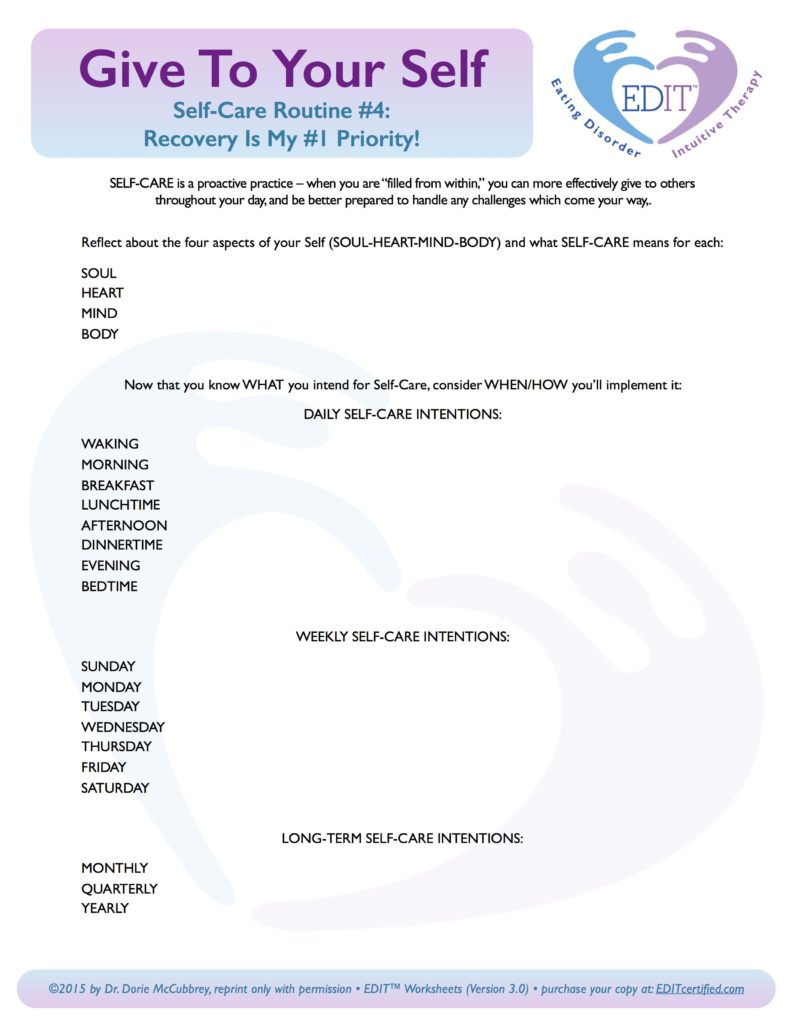Self-Care for Eating Disorders Recovery
We all know we “should” practice Self-Care, but do we? Or, does Self-Care feel like yet another obligation on your mile-long to-do list? Self-Care does require a little bit of work at first – to come up with ideas for your Physical, Mental, Emotional and Spiritual Self-Care practices, and to plan the time for them.
The work will be worth it, because Self-Care for eating disorders recovery is a proactive practice, which can help prevent eating disorder thoughts and behaviors. Self-Care goes beyond coping skills, which are designed to be used as an intervention when faced with triggers. Self-Care is a foundation to rely upon on a daily basis, so that things that used to trigger you have no power over you any more. Self-Care is a way to ensure that you are “filled from within,” so you have no need for binge eating, excessive exercise, or other eating disorder behaviors.
To make things less work for you, here are a few Self-Care ideas to help you get started:
- Physical Self-Care: some common ideas are a hot bath, massage, aromatherapy, soothing lotions, naps; some healthy ideas are scheduling (and keeping) doctor’s appointments, dentist’s appointments, therapist’s appointments; and of course, intuitive eating and mindful movement practices!
- Mental Self-Care: this can be anything that sparks your intellectual interest, like taking a class you’ve wanted to sign up for, or learning a new language; anything that gets that eating disorder mind to take a break!
- Emotional Self-Care: journal writing in the morning can be a great way to “check in” with how you’re feeling, so that you’re emotionally aware and can better address your needs throughout the day; you might also try art therapy as another healthy means of expression; make regular plans with friends/family to enjoy heartfelt connection – you can also do this with nature, or animals (pet your cat, or play with your neighbor’s dog)!
- Spiritual Self-Care: some people consider spiritual practice to be a religious practice, but spirituality doesn’t have to involve religion; become curious about what would “feed your hungry soul,” and help you turn up the volume of your recovery guide, also known as your Intuitive Therapist; try reading some books about spirituality, soulfulness, meditation, or intuition – one of my recent favorite books is “Seven Thousand Ways to Listen” by Mark Nepo!
Self-Care for Eating Disorders Recovery is what the 4th Principle of Eating Disorder Intuitive Therapy (EDIT)™ is all about. Click on the worksheet image below to download and print!
*****
Article may be reprinted with the author bio below.
©2019 by Dr. Dorie McCubbrey. Dr. Dorie is a Certified Eating Disorder Specialist and Licensed Addiction Counselor who is passionate about training professionals to effectively guide clients in recovery from eating disorders, through her Eating Disorder Intuitive Therapy (EDIT)™ Certified program. She also meets with clients at her treatment center, Positive Pathways PLLC, located in Evergreen Colorado. Learn more at: https://www.editcertified.com
*****
Want more that this “taste” of EDIT™? Dr. Dorie is passionate about her method of Eating Disorder Intuitive Therapy (EDIT)™ to help people overcome eating disorders and addictions. She provides customized counseling for eating disorders and alcohol / drug addiction at her Positive Pathways treatment center in Evergreen, Colorado – and EDIT™ eating disorder training and certification for coaches and clinicians worldwide. CALL 303-494-1975 – EMAIL DR. DORIE – GET CERTIFIED


